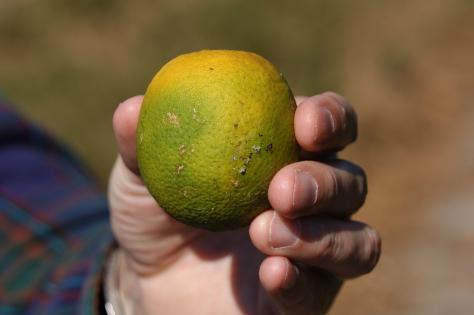Riverside Urges Vigilance After Deadly Citrus Disease Found on Local Tree
Published: 07/28/2017
Contact:
Phil Pitchford
Communications Officer
Riverside Urges Vigilance After Deadly Citrus Disease Found on Local Tree
Citrus greening, known as huanglongbing, or HLB, is a threat to citrus across the state
RIVERSIDE, Calif. – The City of Riverside is urging all owners of citrus trees in the area to remain vigilant and inspect their citrus trees for signs of citrus greening, also known as huanglongbing, or HLB, after the disease was found this week on a tree in northeast Riverside.
State and federal officials removed the infected tree from the property near the intersection of Chicago and Marlborough avenues because the disease, which inevitably kills infected citrus trees, can be transmitted from tree to tree by the Asian citrus psyllid. To learn what an Asian citrus psyllid looks like, how the disease affects trees and how to report sightings, visit CaliforniaCitrusThreat.org.
“Riverside has a long and storied history with citrus dating back more than a century, so any threat to citrus trees is a very serious matter,” Mayor Rusty Bailey said. “It is imperative that all owners of citrus -- from a tree in a backyard to a grove in full production – be aware of the danger posed by HLB and take steps to ensure trees remain disease-free.”
The bacterial disease attacks plants’ vascular system but does not pose a threat to humans or animals. The Asian citrus psyllid can spread the bacteria when the pest moves from one location to another, feeding on citrus trees and other plants. Once a tree is infected there is no cure, and it typically declines and dies within a few years.
The California Department of Food and Agriculture (CDFA) and the United States Department of Agriculture (USDA) confirmed the discovery of HLB after the disease was detected in a CDFA sample collected July 10 from a grapefruit tree in a residential neighborhood.
CDFA worked with the Riverside County Agricultural Commissioner’s Office and USDA to create a survey and treatment program to remove and dispose of the infected tree and treat citrus trees within 800 feet for Asian citrus psyllid infestations. A quarantine within a five-mile radius of where HLB was detected prohibits the sale of all host nursery stock and the movement of all host plants and fruits, both for residents and commercial operations.
Ruben Arroyo, Riverside County Agricultural Commissioner/Sealer, said discovery of the disease means that all citrus trees in the area are at risk.
“It’s important for residents, growers and agricultural officials to work together to quickly find this disease and stop its spread,” Arroyo said.
Riverside’s California Citrus State Historic Park, which preserves the cultural landscape of the citrus industry and tells the story of the industry’s role in the history and development of California, is not affected by the quarantine.
HLB is known to be present in Mexico and in parts of the southern United States. Florida first detected the pest in 1998 and the disease in 2005. The University of Florida estimates that the disease causes an average loss of 7,513 jobs per year, and has cost growers $3 billion in lost revenue since it was first detected there. The Asian citrus psyllid was first detected in California in 2008.
“Citrus is a part of our heritage, our current business community, and our future,” Mayor Pro Tem Mike Gardner said. “It’s very important for everyone who owns a tree to be informed and aware of the potential danger.”
For more information about HLB and what to look for, Riverside County residents may call the Agricultural Commissioner’s Office at
WATCH NOW: Protect Riverside's Citrus, Community Information Session and Update


